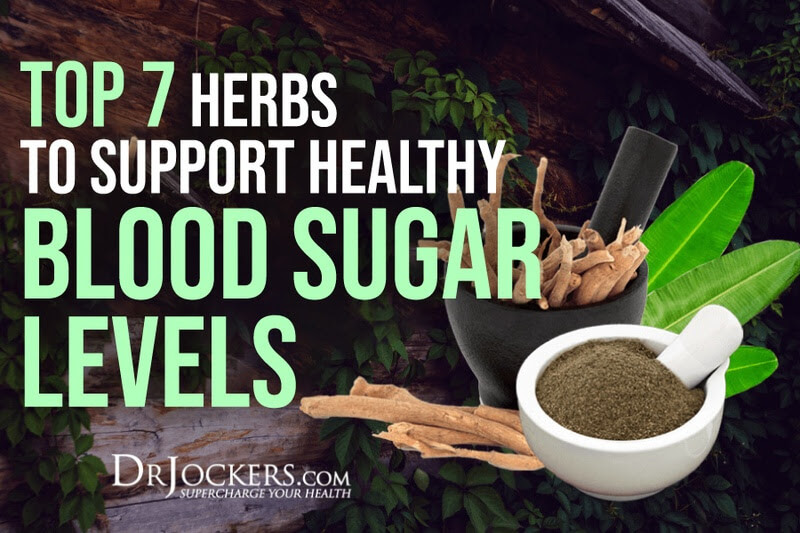 Top 7 Herbs To Support Healthy Blood Sugar Levels
Top 7 Herbs To Support Healthy Blood Sugar Levels
Over 100 million people in the United States are living with prediabetes or diabetes. Many more are experiencing signs of insulin resistance or hypoglycemia, often without knowing.
Yet, supporting healthy blood sugar levels is incredibly important for your health, since chronic blood sugar issues, prediabetes, and diabetes may increase your risk of heart disease, stroke, kidney failure, liver problems, and more. The good news is that through a healthy diet and lifestyle and the use of some powerful herbs, you can support your blood sugar levels and improve your health and well-being.
In this article, I will discuss the importance of healthy blood sugar levels, the damaging effects of advanced glycation end products (AGEs), and the problems with insulin resistance. I will share the top herbs that can help to support healthy blood sugar levels and offer a supplement that can help to support your blood sugar levels and overall health.
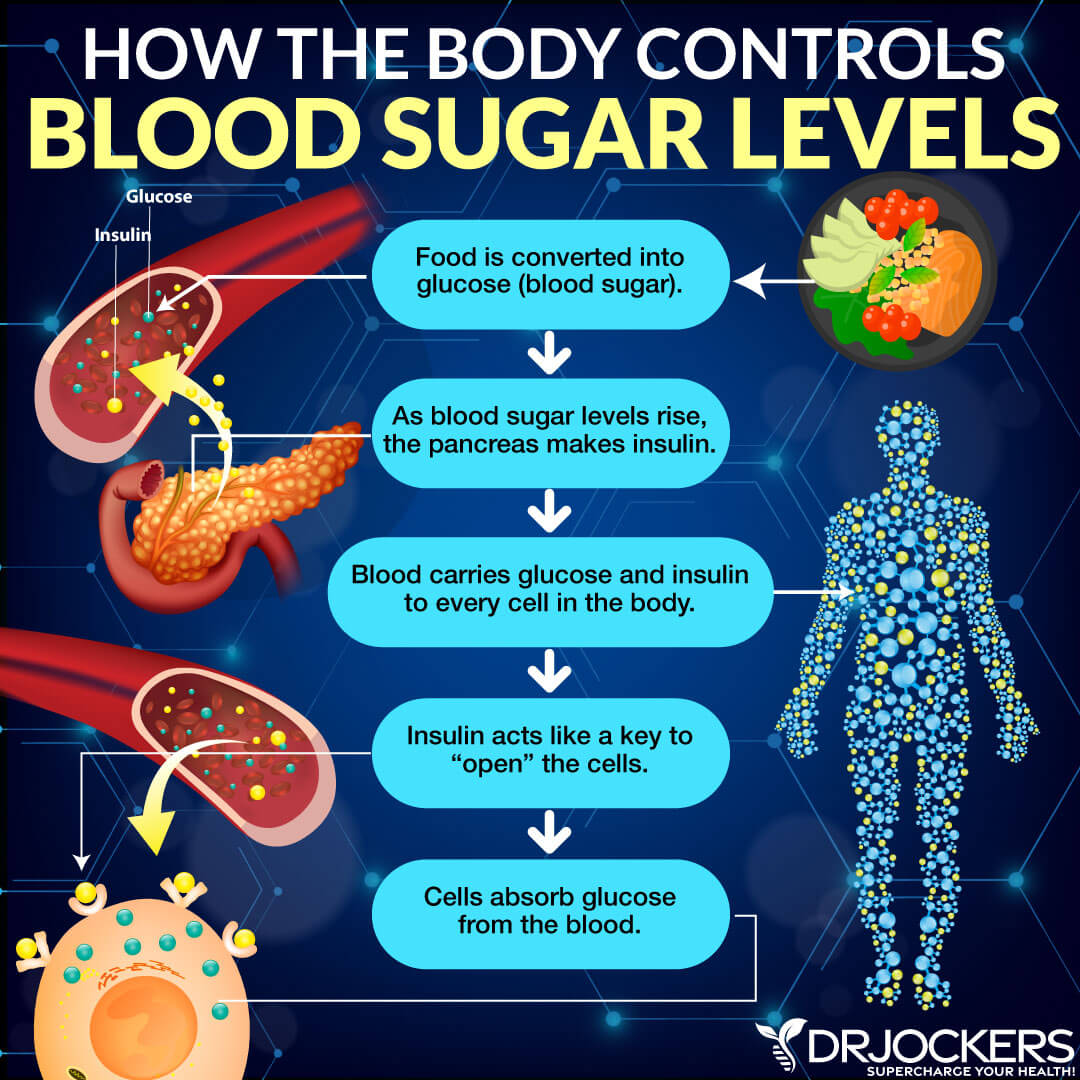
Importance of Healthy Blood Sugar Levels
Maintaining healthy blood sugar levels is critical for your overall health and avoiding prediabetes, diabetes, and other health issues related to unhealthy blood sugar levels. Yet, according to the Centers for Disease Control and Prevention (CDC), over 100 million people in the United States are living with prediabetes or diabetes.
Untreated blood sugar issues, prediabetes, and diabetes can increase your risk of heart disease, stroke, kidney failure, liver issues, vision loss, and other health issues. However, blood sugar level issues, insulin resistance, and hypoglycemic episodes can arise even before you reach the stage of prediabetes or diabetes, making it important to watch your blood sugar levels.
Blood sugar or blood glucose is a sugar that you obtain from your diet that your bloodstream carries to your cells to create and supply energy. Healthy blood glucose levels mean that there is enough blood sugar in your body for energy, but not too much to overload your system.
If your blood sugar levels drop below the normal range of about 70 mg/dL, it means that you have hypoglycemia. Hyperglycemia is characterized by consistently high blood sugar levels. It often develops when your body doesn’t have enough insulin to deal with all the blood sugar or develops lower insulin sensitivity.
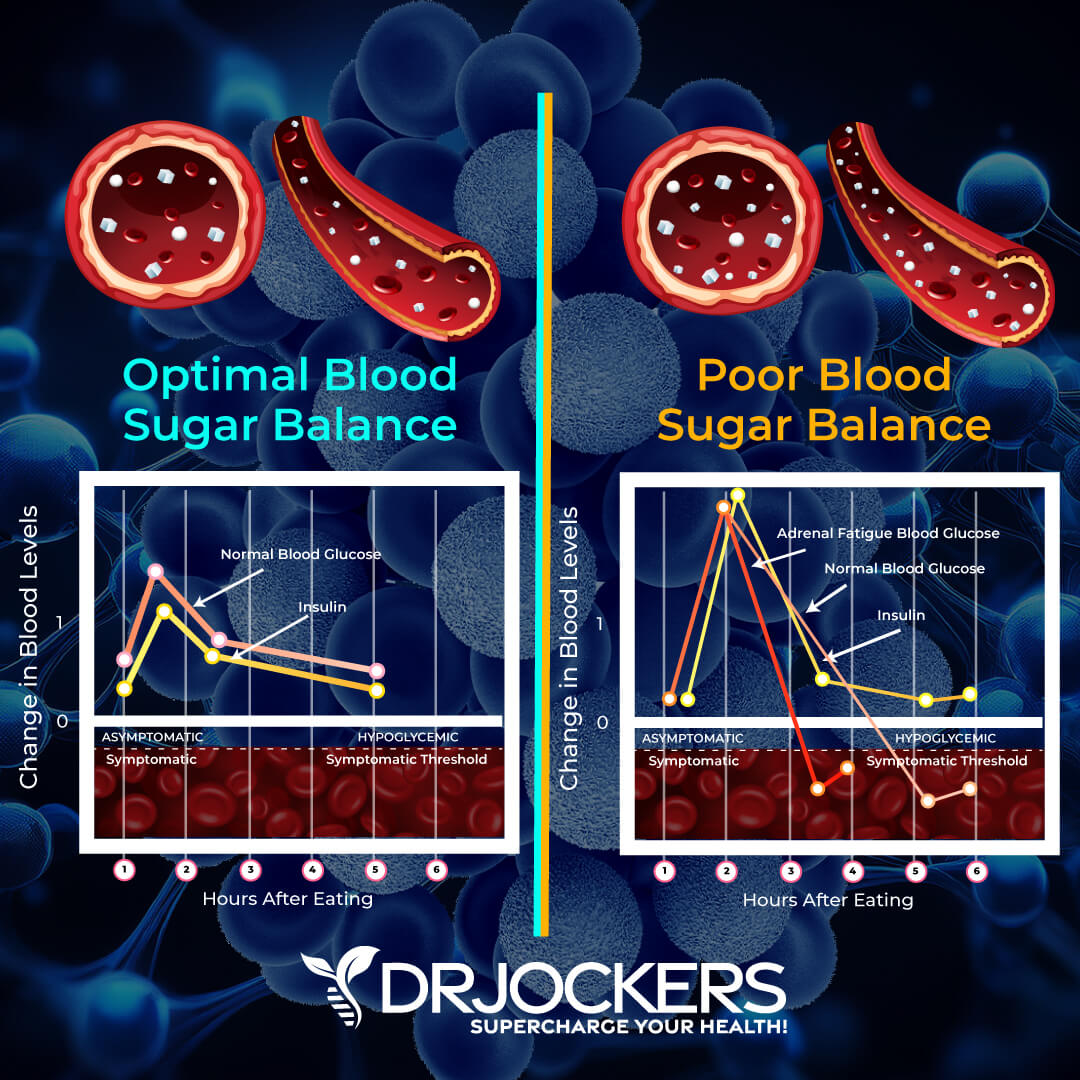
The Problem With Low Blood Sugar
Hypoglycemia may develop when you are eating too many fast-digesting carbs that lead to a large insulin spike followed by a quick blood sugar drop. This can become a chronic problem if you are relying on sugary or carb-heavy foods.
Hypoglycemia is also common in diabetic individuals when their condition is poorly managed or untreated or they administer too much insulin after a meal. Short-term hypoglycemia may develop when your body burns up all the stored sugar but not yet adapted to use fats as an alternative energy source through a low-carbohydrate ketogenic diet.
When you have hypoglycemia, your body goes into a panic state and can develop an array of symptoms, including fatigue, irritability, moodiness, sudden hunger, muscle weakness, or shakiness in your hand. People commonly experience hypoglycemic episodes in the mid-afternoon several hours after a carb-heavy mid-day meal.
It is important that you pay attention to hypoglycemic episodes and signs of blood sugar imbalances, as they may be a sign or precursor of prediabetes, insulin resistance, or diabetes. Hypoglycemia and blood sugar imbalances are also warning signs that you may need a diet and lifestyle change to create healthy blood sugar levels, improve your health, and lower the risk of health issues. To learn more about hypoglycemia, I recommend reading this article (1, 2).
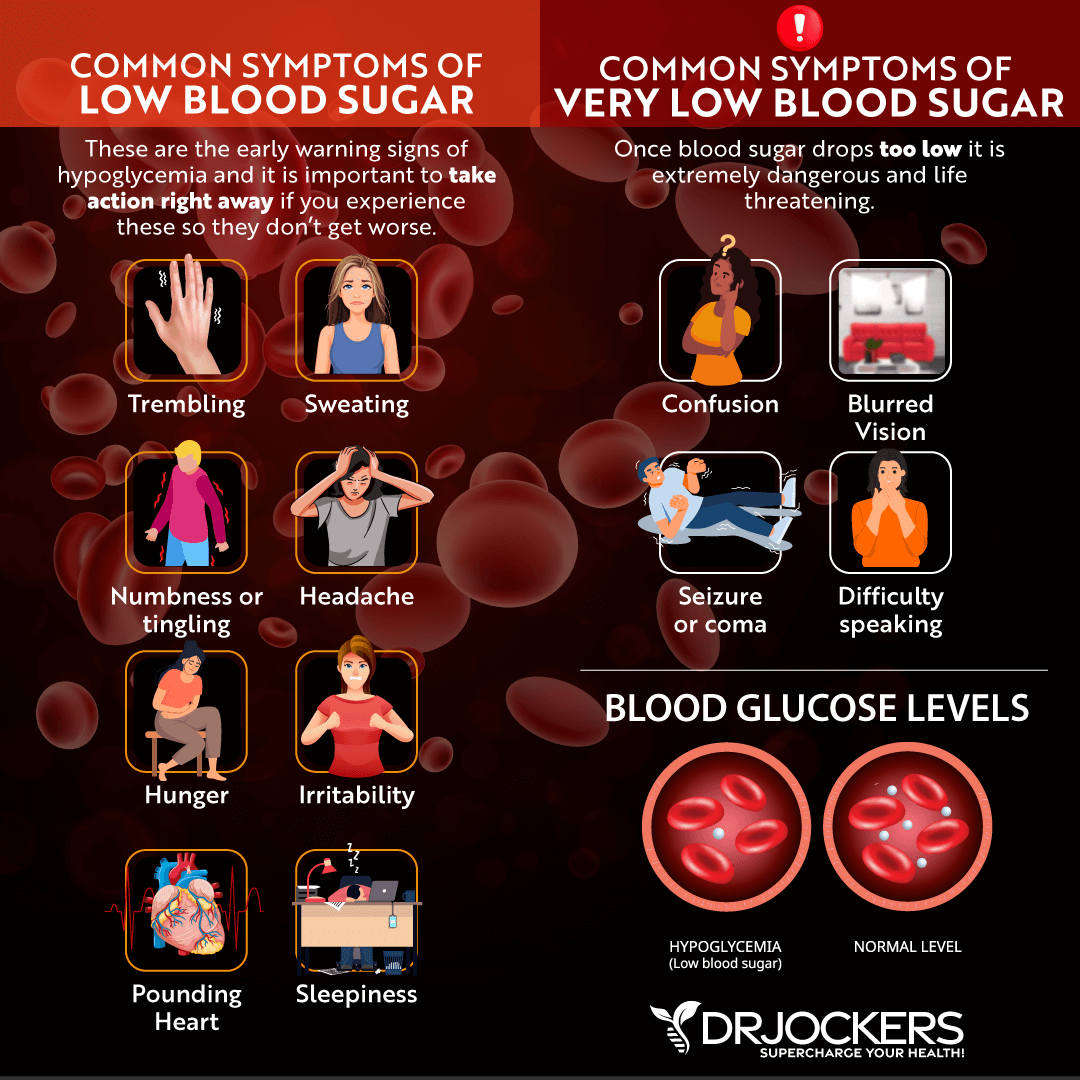
The Damaging Effects of AGEs
Advanced glycation end products (AGEs) are harmful compounds created in your body when fat or protein combine with sugar in your bloodstream through the process of glycation. AGEs can also form in foods through frying, grilling, roasting, barbecuing, toasting, or other methods when they are exposed to high temperatures.
In fact, diet is usually the main source of AGEs and can cause many problems. Fried foods and heavily processed foods are especially high in AGEs. When we consume high carbohydrate foods, they turn into sugar or glucose in our bloodstream. If we are unable to clear the sugar out of the bloodstream, the sugar molecules combine with proteins and create AGEs.
The good news is that your body can fight AGEs through antioxidant and enzymatic activities. The problem is that when you are eating too many foods that create AGEs, your body won’t be able to keep up with it and AGEs end up accumulating in your body.
Prolonged bouts of hyperglycemia or high blood sugar result in a large production of AGEs which damage the endothelial lining of the blood vessels, nerves, joints, and organs. High levels of AGEs can increase inflammation and oxidative stress and increase your risk of diabetes, heart disease, strokes, kidney failure, liver problems, Alzheimer’s disease, and other health issues.
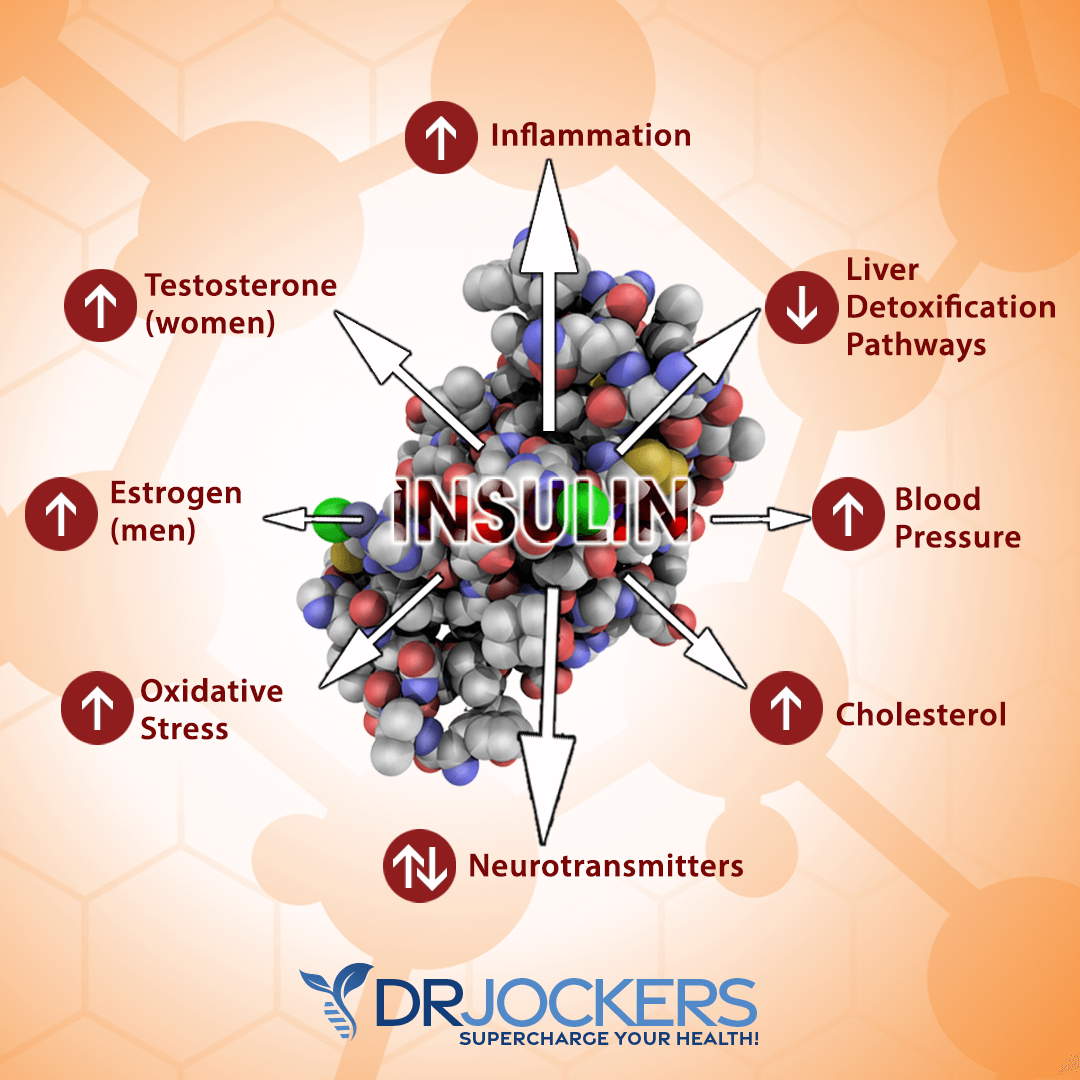
AGEs and Risk of Disease
According to a 2009 study on 559 older women, those with the highest levels of AGEs had the highest risk of dying from heart disease. A 2015 study found that obese individuals with metabolic syndrome had higher AGE levels than otherwise healthy but also obese individuals.
Other research has found similar connections between AGEs, blood sugar issues, and various serious health problems. Those with high blood sugar levels are at a higher risk of producing too many AGEs and being affected by AGEs from their diet (3, 4, 5, 6, 7, 8, 9).

The Problem with Insulin Resistance?
Insulin is a very important hormone in your body and is created by your pancreas. It helps your cells to absorb and use sugar and assists blood glucose to enter your cells in your fat, muscles, and liver to be used for energy.
When you eat, your blood sugar levels increase. To deal with all the blood sugar, your pancreas releases insulin to help lower your blood sugar and create balanced, normal blood sugar levels. If you have insulin resistance, it means that your body is unable to respond to or use the insulin produced by your body.
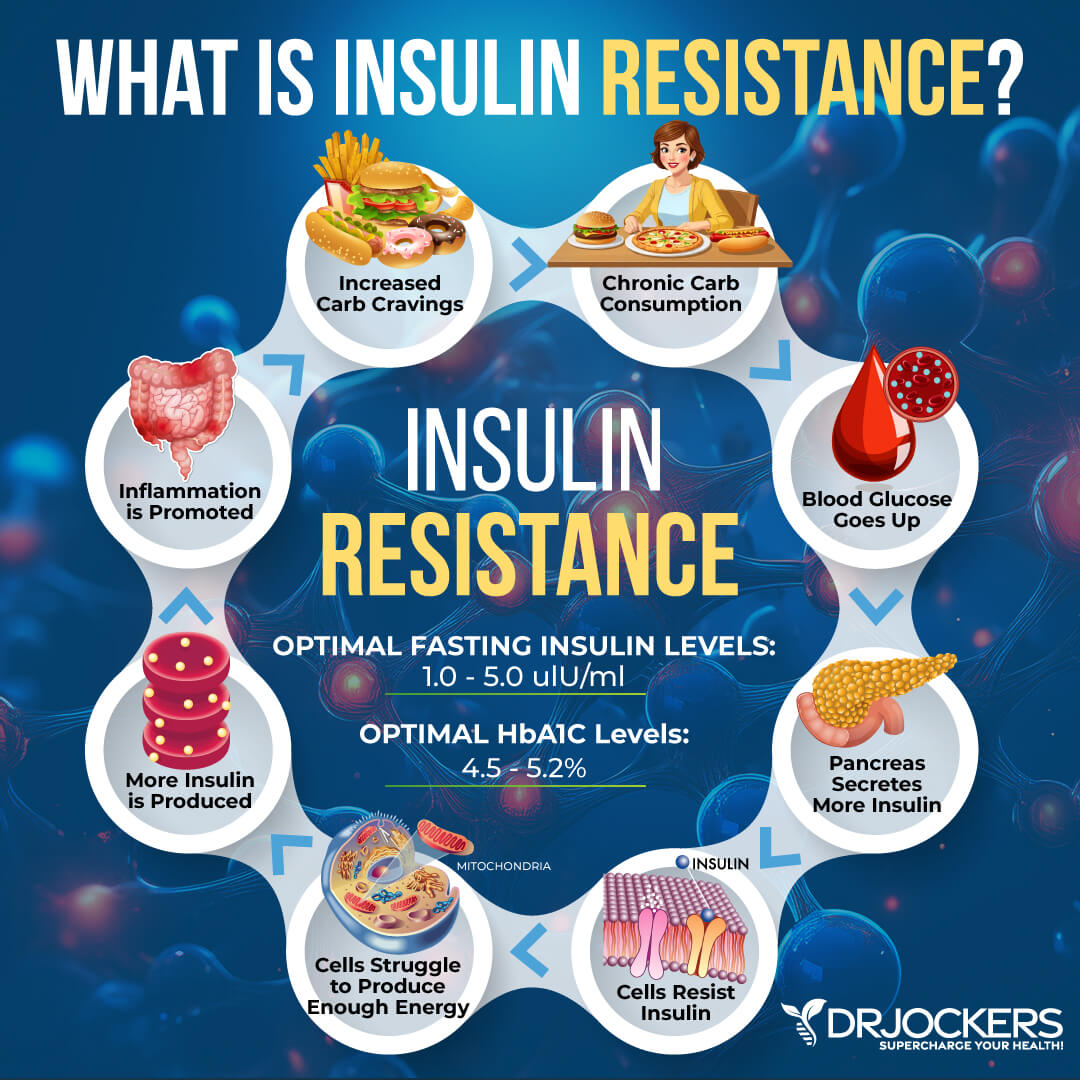
This means that your muscles, fat, and liver won’t be able to easily absorb and use blood sugar. This will drive your pancreas to overwork and increase the release of insulin trying to make up for your body’s weak response to insulin and trying to keep your blood sugar levels at a healthy range.
The problem is that the beta cells in your pancreas won’t be able to keep up with the excessive insulin demand leading to blood glucose build-up. This increases your risk of prediabetes and type 2 diabetes, as well as consequent health risks and health issues.
Signs of insulin resistance may include having a large appetite, intense sugar cravings, being overweight, trouble losing weight, fatigue after meals, frequent thirst or urination, hormonal issues, estrogen or testosterone dominance in females, low testosterone in males, acne, skin issues, high blood pressure, and other health issues.
However, insulin resistance can go without symptoms and without being noticed for years, which makes it even more important to pay attention to your body and your lifestyle to support healthy blood sugar levels. To learn more about insulin resistance, I recommend this article.
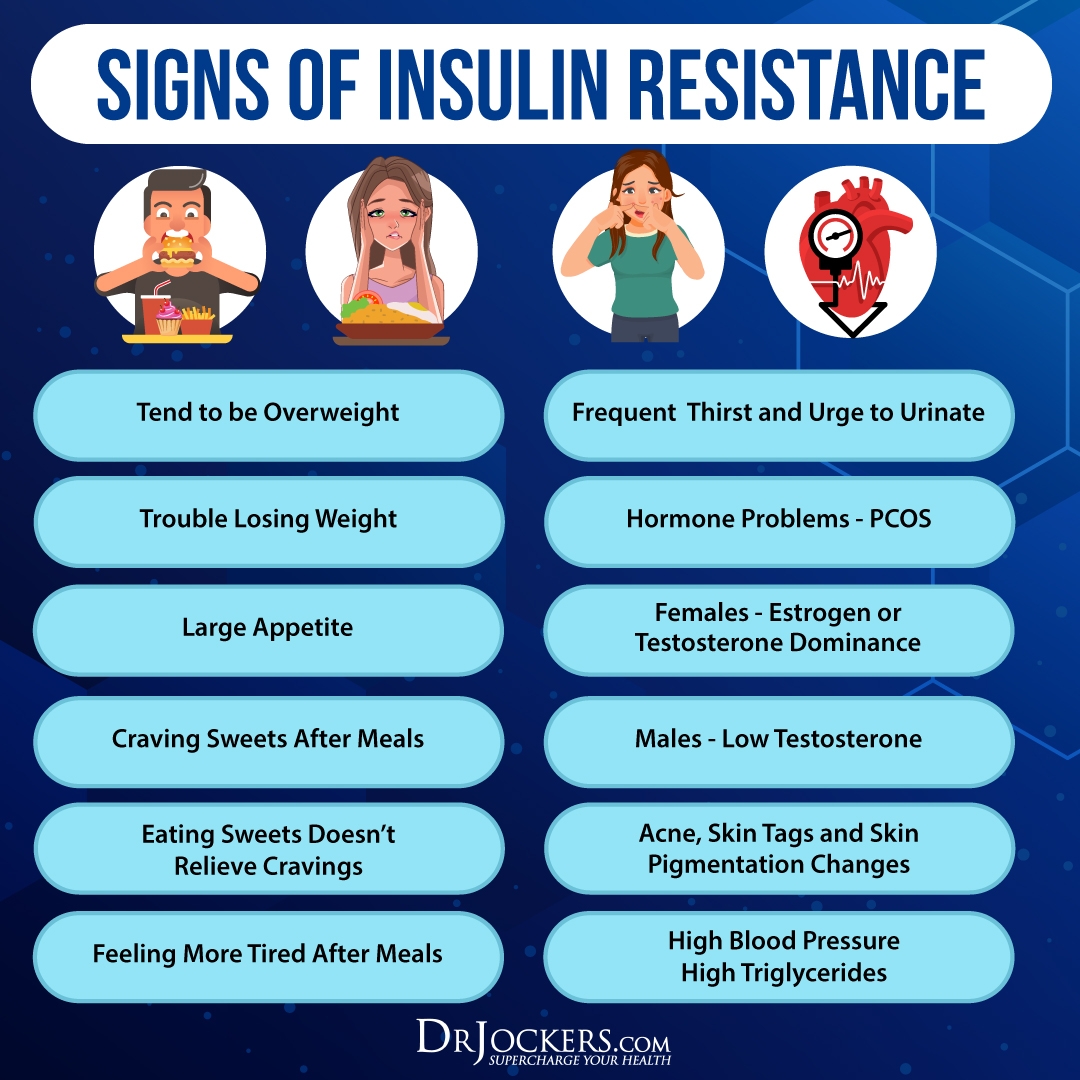
Best Herbs to Support Healthy Blood Sugar Levels
Eating a healthy, nutrient-dense diet low in carbs and low in AGEs is key for supporting healthy blood sugar levels. Additionally, I recommend that you use some specific herbs that have been shown to support healthy blood sugar levels. Here are the herbs I recommend for healthy blood sugar levels:
Berberine
Berberine is a powerful health compound that has been used for thousands of years by Chinese and Ayurvedic medicine. It has been highly regarded for its efficacy in supporting healthy blood sugar levels and insulin sensitivity. Research has shown that berberine may benefit the treatment of type 2 diabetes and have a positive impact on blood sugar levels, insulin, and triglycerides.
According to a 2019 meta-analysis, berberine is better than a placebo at lowering blood sugar levels and seems to be more effective when used in combination with blood sugar effective drugs when using medication alone.
A 2014 study has found that berberine may benefit those with diabetes who cannot take antidiabetic medication due to heart, kidney, or liver problems. According to a 2014 meta-analysis, combining berberine with lifestyle changes is more effective than lifestyle changes alone for improving blood sugar levels (10, 11, 12).
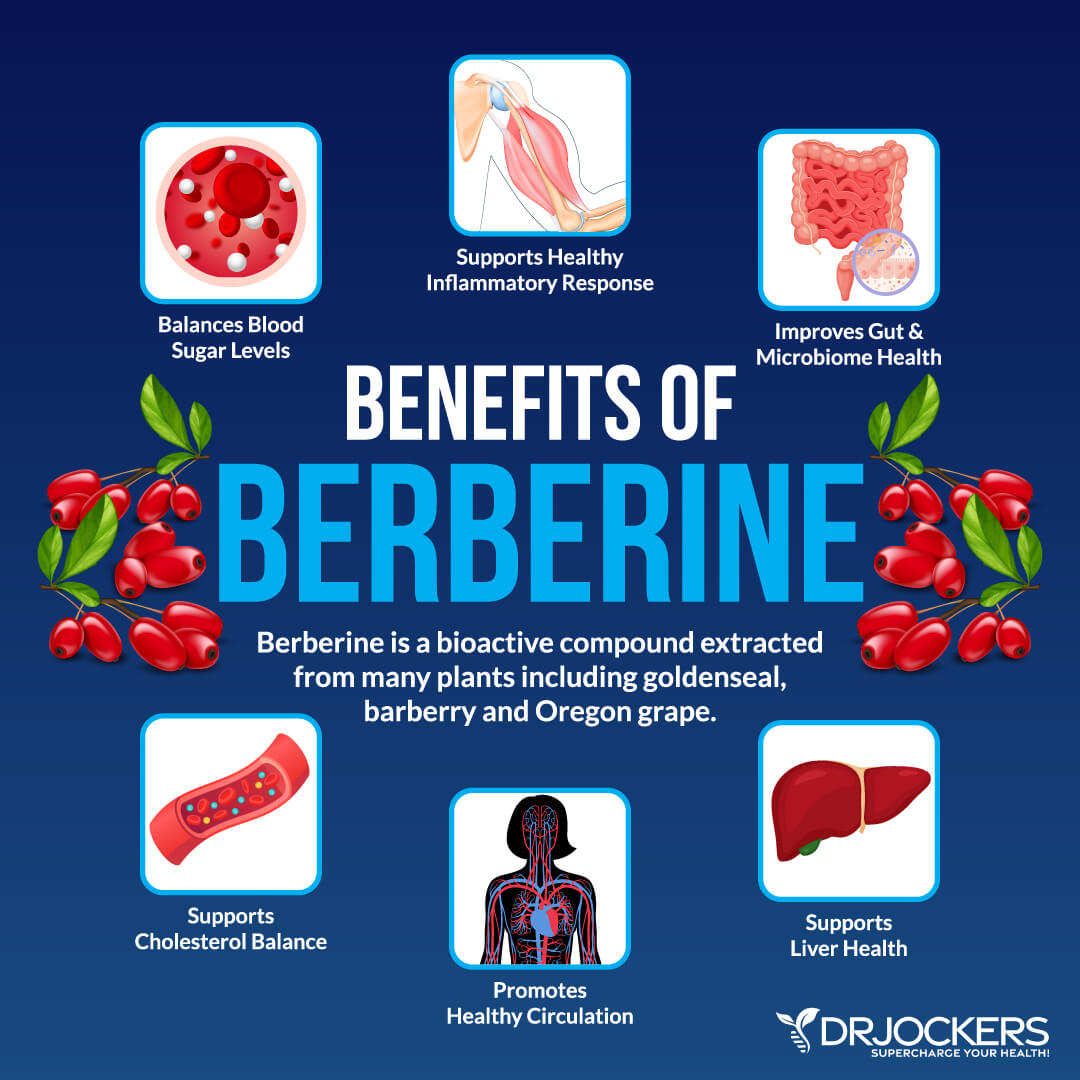
Cinnamon
Cinnamon is an aromatic spice that’s high in antioxidants and has countless health benefits including supporting your blood sugar levels. According to a 2009 study, taking 500 mg of cinnamon for 12 weeks has decreased oxidative stress in people with prediabetes.
A 2001 study found that cinnamon may lower blood sugar levels, may imitate the effects of insulin, and help transport blood glucose. According to a 2007 in vivo study, cinnamon can help to increase insulin sensitivity for up to 12 hours (13, 14, 15).

Gymnema
Gymnema Sylvestre is native to India, Africa, and Australia, and has been a major part of Indian and Ayurvedic medicine. According to a 1983 and 2007 research, gymnema can decrease your cravings for sweet foods by reducing your perception of sweetness.
As a result, it may help to support blood sugar levels by reducing your risk of overwhelming your body with sugary food. According to a 2017 study, taking gymnema in combination with blood sugar medication can effectively lower blood sugar levels.
According to a 2017 study taking 200 to 400 mg of gymnema may decrease blood sugar absorption and according to 2011 research, supplementing with gymnema can lower blood sugar levels after meals and lower the risk of diabetes complications (16, 17, 18, 19, 20).
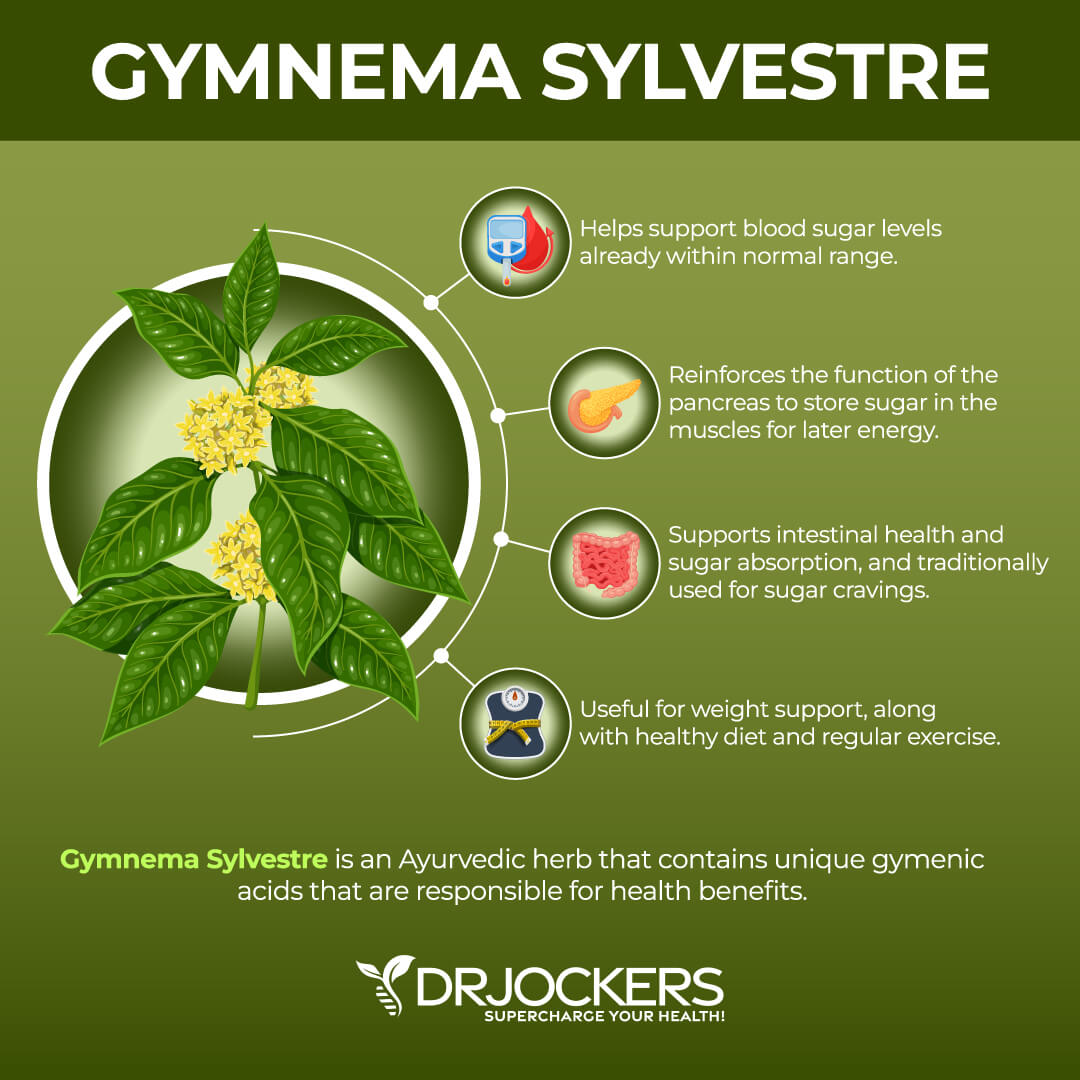
American Ginseng
American ginseng is a type of ginseng that is primarily found in North America. It is known for its benefits for type 2 diabetes. According to a 2018 study, American ginseng can help to lower post-meal blood sugar by 20 percent.
A 2000 and 2016 research both found that American ginseng can improve your body’s cellular response. They also found that 1 gram about two hours before a meal seems to be the most effective dose and anything over 3 grams doesn’t show a difference in benefits (21, 22, 23).
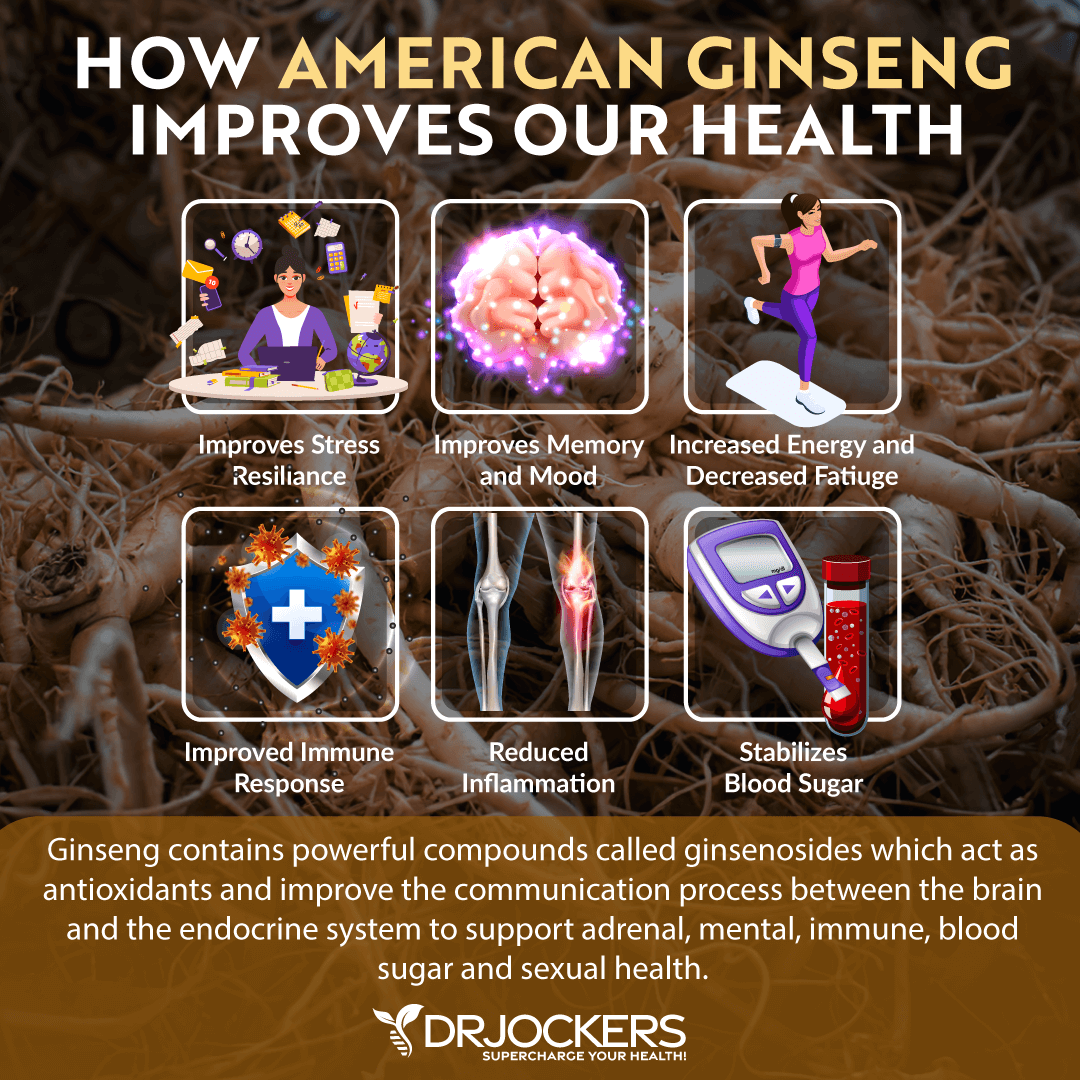
Fenugreek
Though fenugreek was first recorded in Egypt in 1500 BC, it mainly grows in Europe and Asia. It can be used as a spice, tea, and supplement for its numerous health benefits.
Fenugreek contains a specialized type of soluble fiber called galactomannon that slows the absorption of glucose in the blood stream. In addition, it is rich in steroid-like saponins which help to improve bile flow and stabilize blood sugar, triglycerides and cholesterol levels.
According to a 2009 study, using 10 grams of fenugreek seeds soaked in hot water may help people with diabetes. Another 2009 study suggests that fenugreek may lower insulin resistance when used as fenugreek flour in bread and other baked goods. A 2017 scientific review has discussed that fenugreek supplements may lower fasting blood sugar levels (24, 25, 26).

Kudzu
Kudzu is a native perennial vine in Asia with so many health benefits, including supporting your blood sugar levels. This is commonly used in traditional Chinese medicine, and it contains phytonutrients and phytoestrogens to help improve blood sugar, cravings, inflammation and sex hormone balance.
According to 2013 research on mice, puerarin, a bioactive isoflavone found in kudzu, helps to increase insulin expression and support blood sugar levels. A recent 2020 study has also found that kudzu root showed anti-diabetic benefits in diabetic rats (27, 28).
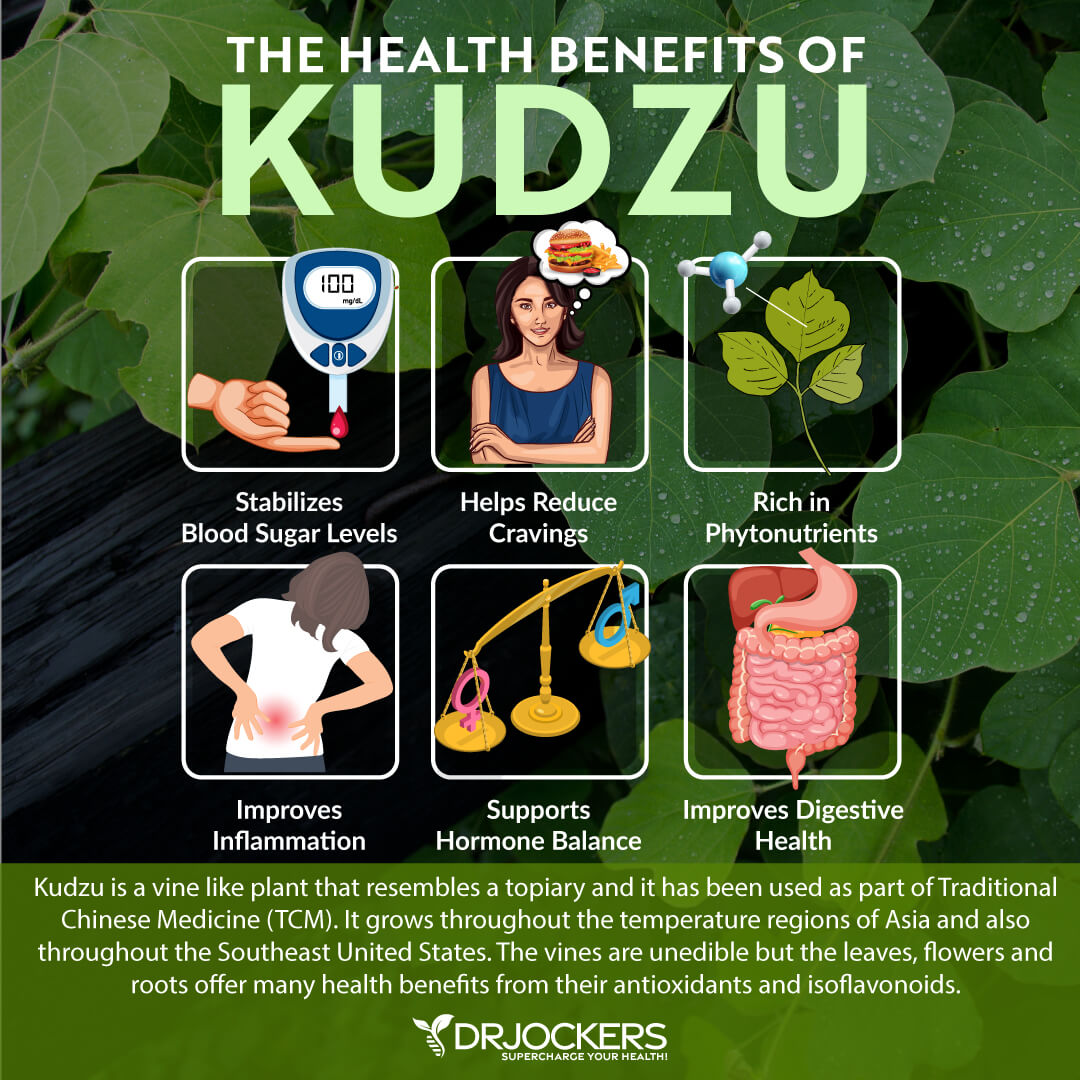
Banaba Leaf
Banaba leaf is from a medium-sized tree in Southeast-Asia that has been used for its medicinal properties for centuries. A 2012 scientific review has discussed the benefits of banaba leaf on metabolic syndrome and its benefits on glucose uptake and blood sugar levels. The active ingredient in banaba leaf is corosolic acid which is thought to be responsible for its health benefits.
A 2008 study has found that banaba leaf can help improve glucose uptake by enhancing insulin receptor activity and as a result may benefit blood sugar levels. A 2009 research has supported the idea that banaba leaf may complement diabetes treatment (29, 30, 31).
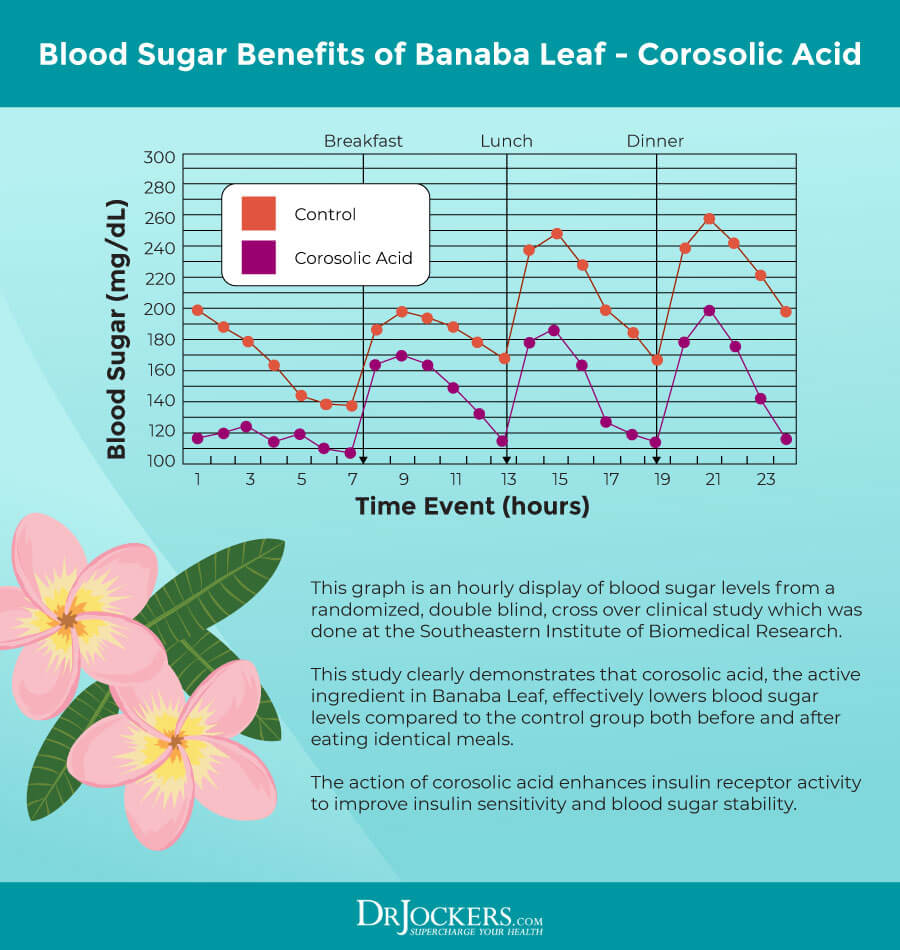
Introducing Sugar Support
To support your blood sugar levels with the help of these potent herbs, I recommend Sugar Support. This powerful supplement is supported by berberine, cinnamon extract, banaba leaf extract, American ginseng root, fenugreek, kudzu, and gymnema extract.
I recommend taking four capsules with each meal for maximum support. It supports blood sugar metabolism, insulin sensitivity, mental clarity, and good energy levels while reducing sugar cravings. If you are currently taking any medication for blood sugar control or diabetes, talk to your healthcare provider before taking this or any other supplement for your blood sugar levels.
Final Thoughts
Diabetes, prediabetes, hypoglycemia, and insulin resistance are rampant in our country. They can increase your risk of heart problems, stroke, kidney failure, liver problems, and countless other serious health issues.
Supporting your blood sugar levels is critical for your health. Follow my tips and try the herbs I recommend to reduce your sugar cravings, support your blood sugar levels, and improve your overall health and well-being.
If you want to work with a functional health coach, I recommend this article with tips on how to find a great coach. On our website, we offer long-distance functional health coaching programs. For further support with your health goals, just reach out—our fantastic coaches are here to support your journey.
Inflammation Crushing Ebundle
The Inflammation Crushing Ebundle is designed to help you improve your brain, liver, immune system and discover the healing strategies, foods and recipes to burn fat, reduce inflammation and Thrive in Life!
As a doctor of natural medicine, I have spent the past 20 years studying the best healing strategies and worked with hundreds of coaching clients, helping them overcome chronic health conditions and optimize their overall health.
In our Inflammation Crushing Ebundle, I have put together my very best strategies to reduce inflammation and optimize your healing potential. Take a look at what you will get inside these valuable guides below!
Sources in This Article Include:
1. New CDC report: More than 100 million Americans have diabetes or prediabetes. CDC. Link Here
2. What should my blood glucose level be? Medical News Today. Link Here
3. Schmidt AM, Hori O, Brett J, Yan SD, Wautier JL, Stern D. Cellular receptors for advanced glycation end products. Implications for induction of oxidant stress and cellular dysfunction in the pathogenesis of vascular lesions. Arterioscler Thromb. 1994;14(10):1521-1528. Link Here
4. Wu X, Monnier VM. Enzymatic deglycation of proteins. Arch Biochem Biophys. 2003;419(1):16-24. Link Here
5. Conner JR, Beisswenger PJ, Szwergold BS. Some clues as to the regulation, expression, function, and distribution of fructosamine-3-kinase and fructosamine-3-kinase-related protein. Ann N Y Acad Sci. 2005;1043:824-836. Link Here
6. Uribarri J, Cai W, Peppa M, et al. Circulating glycotoxins and dietary advanced glycation endproducts: two links to inflammatory response, oxidative stress, and aging. J Gerontol A Biol Sci Med Sci. 2007;62(4):427-433. Link Here
7. Singh R, Barden A, Mori T, Beilin L. Advanced glycation end-products: a review [published correction appears in Diabetologia 2002 Feb;45(2):293]. Diabetologia. 2001;44(2):129-146. Link Here
8. Semba RD, Ferrucci L, Sun K, et al. Advanced glycation end products and their circulating receptors predict cardiovascular disease mortality in older community-dwelling women. Aging Clin Exp Res. 2009;21(2):182-190. Link Here
9. Uribarri J, Cai W, Woodward M, et al. Elevated serum advanced glycation endproducts in obese indicate risk for the metabolic syndrome: a link between healthy and unhealthy obesity?. J Clin Endocrinol Metab. 2015;100(5):1957-1966. Link Here
10. Liang Y. Effects of berberine on blood glucose in patients with type 2 diabetes mellitus: a systematic literature review and a meta-analysis. Link Here
11. Chang W. Berberine as a therapy for type 2 diabetes and its complications: From mechanism of action to clinical studies. 1 December 2014.. LInk Here
12. Lan J. Meta-analysis of the effect and safety of berberine in the treatment of type 2 diabetes mellitus, hyperlipemia and hypertension. Journal of Ethnopharmacology
Volume 161, 23 February 2015, Pages 69-81. Link Here
13. Roussel AM, Hininger I, Benaraba R, Ziegenfuss TN, Anderson RA. Antioxidant effects of a cinnamon extract in people with impaired fasting glucose that are overweight or obese. J Am Coll Nutr. 2009;28(1):16-21. Link Here
14. Jarvill-Taylor KJ, Anderson RA, Graves DJ. A hydroxychalcone derived from cinnamon functions as a mimetic for insulin in 3T3-L1 adipocytes. J Am Coll Nutr. 2001;20(4):327-336. LInk Here
15. Solomon TP, Blannin AK. Effects of short-term cinnamon ingestion on in vivo glucose tolerance. Diabetes Obes Metab. 2007;9(6):895-901. Link Here
16. Kanetkar P, Singhal R, Kamat M. Gymnema sylvestre: A Memoir. J Clin Biochem Nutr. 2007;41(2):77-81. Link Here
17. Brala PM, Hagen RL. Effects of sweetness perception and caloric value of a preload on short term intake. Physiol Behav. 1983;30(1):1-9. Link Here
18. Tiwari P, Ahmad K, Baig MH. Gymnema sylvestre for Diabetes: From Traditional Herb to Future’s Therapeutic. Curr Pharm Des. 2017;23(11):1667-1676. Link Here
19.Tiwari P, Ahmad K, Baig MH. Gymnema sylvestre for Diabetes: From Traditional Herb to Future’s Therapeutic. Curr Pharm Des. 2017;23(11):1667-1676. Link Here
20. Effect of Extended Release Gymnema Sylvestre Leaf Extract (Beta Fast GXR). Diabetes in Control. Link Here
21. McKennon SA. Non-Pharmaceutical Intervention Options For Type 2 Diabetes: Diets And Dietary Supplements (Botanicals, Antioxidants, and Minerals). In: Feingold KR, Anawalt B, Boyce A, et al., eds. Endotext. South Dartmouth (MA): MDText.com, Inc.; 2000. Link Here
22. Vuksan V, Xu ZZ, Jovanovski E, et al. Efficacy and safety of American ginseng (Panax quinquefolius L.) extract on glycemic control and cardiovascular risk factors in individuals with type 2 diabetes: a double-blind, randomized, cross-over clinical trial. Eur J Nutr. 2019;58(3):1237-1245. Link Here
23. Luo JZ, Kim JW, Luo L. EFFECTS OF GINSENG AND ITS FOUR PURIFED GINSENOSIDES (Rb2, Re, Rg1, Rd) ON HUMAN PANCREATIC ISLET β CELL IN VITRO. Eur J Pharm Med Res. 2016;3(1):110-119. Link Here
24. Yilmaz Z, Piracha F, Anderson L, Mazzola N. Supplements for Diabetes Mellitus: A Review of the Literature. J Pharm Pract. 2017;30(6):631-638. Link Here
25. Kassaian N, Azadbakht L, Forghani B, Amini M. Effect of fenugreek seeds on blood glucose and lipid profiles in type 2 diabetic patients. Int J Vitam Nutr Res. 2009;79(1):34-39. Link Here
26. Losso JN, Holliday DL, Finley JW, et al. Fenugreek bread: a treatment for diabetes mellitus. J Med Food. 2009;12(5):1046-1049. Link Here
27. Wu K, Liang T, Duan X, Xu L, Zhang K, Li R. Anti-diabetic effects of puerarin, isolated from Pueraria lobata (Willd.), on streptozotocin-diabetogenic mice through promoting insulin expression and ameliorating metabolic function. Food Chem Toxicol. 2013;60:341-347. Link Here
28. Duru KC. Anti-diabetic effect of isoflavone rich kudzu root extract in experimentally induced diabetic rats. Journal of Functional Foods
Volume 68, May 2020. Link Here
29. Shi L, Zhang W, Zhou YY, et al. Corosolic acid stimulates glucose uptake via enhancing insulin receptor phosphorylation. Eur J Pharmacol. 2008;584(1):21-29. Link Here
30. Stohs SJ, Miller H, Kaats GR. A review of the efficacy and safety of banaba (Lagerstroemia speciosa L.) and corosolic acid. Phytother Res. 2012;26(3):317-324. Link Here
31. Hou W, Li Y, Zhang Q, et al. Triterpene acids isolated from Lagerstroemia speciosa leaves as alpha-glucosidase inhibitors. Phytother Res. 2009;23(5):614-618. Link Here






Article states “Hypoglycemia is characterized by consistently high blood sugar levels.”
Surely this is a typo or is incorrect. Shouldn’t it be low blood sugar levels?
Yes, we changed that. Thank you!
How can you lower your cholesterol naturally? I eat healthy but my cholesterol was 175 awhile back.
Hello Pam – that is a great question that I address in this article: https://drjockers.com/cholesterol-what-is-it-and-what-are-healthy-levels/
Why doesn’t your Zinc contain Copper in it?
We find that most people have too much copper and copper is much easier to get from food and is easier to absorb than zinc. Read this article: https://drjockers.com/15-zinc-deficiency-symptoms/
Hey Doc, what about the telomerase-decreasing effect of Berberine?
Is it something we should worry?
No, that research has not been shown to be significant.
Beware Berberine is a K+ channel blocker. It could be dangerous if you have a low pulse rate. See http://www.ncbi.nlm.nih.gov/pmc/articles/PMC7698807/
Hey Frans, this study dosn’t say it is a K+ channel blocker it says that it balances K+ channel activation. No evidence that I have seen that would say it is dangerous for individuals with a low pulse rate. “Berberine is a vegetable alkaloid with many intrinsic properties. Some of its antihypertensive effects include both endothelium and vascular smooth muscle vasodilatation. The latter seems to be dose-dependent, and it results from augmented NO release (by eNOS increased expression), reduction of ACE effect, balancing of K+ channels activation, and intracellular Ca++ channels release.”
I’d like to add here a super herb called Mistletoe. Has lots of benefits according to the Maria Treben book what’s known from WW2. Good for chilblains. “Since Mistletoe benefits the whole glandular system it also aids the metabolism. At the same time it favorably influences the pancreas so that through drinking Mistletoe tea over a long period, diabetes loses its original cause. Especially people who suffer from chronic metabolic disorders should try to drink Mistletoe tea regularly for six months. It is excellent for hormonal imbalance. In this case at least 2 cups a day, one in the morning and one in the evening, are sipped. For hardening of the arteries Mistletoe is an excellent remedy, esteemed and recommended for stroke, which would scarcely have happened, had the tea been drunk regularly. After a stroke drink 3 cups a day for 6 weeks, 2 cups for 3 weeks and 1 cup for 2 weeks; the first cup, half before and half after breakfast, the second cup before and after lunch and the third cup before and after dinner. Mistletoe tea is also used as a blood-staunching remedy. It stops nose-bleeding when used cold, if drawn up into the nose. As a tea it arrests lung- and intestines-bleeding caused by typhoid or dysentery.
Mistletoe is the best remedy for heart and circulatory complaints. I cannot emphasize Mistletoe enough for circulatory problems. Since it has active substances which normalize the whole system, it lowers high and raises low blood pressure. lt soothes the restless heart and strengthens it. All the side effects of abnormal blood pressure such as blood rushing to the head, dizziness, buzzing in the ears and visual defects disappear. Mistletoe, it can be said, is invaluable in all heart and circulatory disorders. People in our fast moving times, with the tensions of modern living and working under stress, surely need an aid like Mistletoe.
In many letters I have received, people state that thanks to Mistletoe they have found relief in a short time from high blood pressure, bad circulatory problems, lack of energy, heart disorders, heart flutters, dizziness and unwillingness to work. 3 cups of Mistletoe, made as a cold infusion and sipped throughout the day, will normalize your heart and your circulation and guarantee an increased work activity. Ln general, Mistletoe tea should be drunk for six weeks, once a year; 3 cups for 3 weeks, 2 cups for 2 weeks and 1 cup for 1 week. Blood pressure and circulation will have recovered after this. To keep it that way it is of benefit to keep on drinking 1 cup in the morning for a year. Women, too, should take Mistletoe tea. The normalized circulation brings uterine and menstrual disorders into equilibrium, especially heavy menstruation as well as bleeding after confinement. For palpitations of the heart, difficulties in breathing, hot flushes and feelings of anxiety during menopause, Mistletoe tea, drunk for a few years, brings relief and you will pass through the change naturally. The fresh juice of Mistletoe, 25 drops in water on an empty stomach before breakfast and 25 drops in water in the evening before going to bed will remedy bareness in woman.
Lately, Mistletoe is used medicinally to counteract and prevent cancer. Again and again we are shown, how herbs are effective in disease prevention as well as cleansing the body of harmful substances. – Use the herbs and do your body a favour; it will keep you healthy and strong.
Cited from Maria Treben
Thanks for sharing this Violet!
You’re welcome! I have th book,has stories in it about how people got healed. I like to learn about herbs. Especially, because I have a 7y old son, he wasn’t vaccinated but he has ADHD and TS syndrome.
I wish, some doctors would know in CA what in EU Dr’s find out in Neuro science the Non-invasive High Frequency Median Nerve Stimulation, what they claim it’s effectively suppresses tics.
I was wondering what your opinion was on misttletoe. Thank you.
Yes it is a very promising treatment option for cancer.
it is poisonous for cats!
Thanks for sharing
You are welcome!
Hi Dr. Jockers,
I love your site and find myself always referring back to your articles….
Regarding berberine for long term use for diabetes, is their any concern that being a anti microbial, it can negatively affect the commensal bacteria in the gut?
Thank you.
Hello Daniel, our experience with berberine is that it has a modulating impact on the gut and helps to create better balance and diversity in the gut microbiome.
Here, you recommend 4 Sugar Support with each meal. On the Sugar Support page, it says “4 capsules per day.” Can you address this discrepancy?
Hi Dr. Jockers!
i have been reading about and very much considering your recommendation for a 7-day liver cleanse. i am Type II diabetic, HBP and high cholesterol and i no longer have a gallbladder. i do plan to discuss this with my PCP on my next appointment, but wanted to hear from you about not having a gallbladder. What will the results be? Will there side effects?
Yes this cleanse will greatly benefit you!
Yes this will definitely help you and here are some good strategies for living without a gallbladder: https://drjockers.com/no-gallbladder-strategies/
Hi Dr. Jockers,
Are there any recommendations for Vascular Disease?
Also, how can I order some of your vitamins?
Thank you and I look forward to receive your feedback
Doctor, I live in Africa, and we use tea made from mulberry, avocado, or guava leaves, as well as moringa, bitter melon, okra, and Momordica balsamina. What are your thoughts on this, and what information can you share about its effectiveness or associated risks?